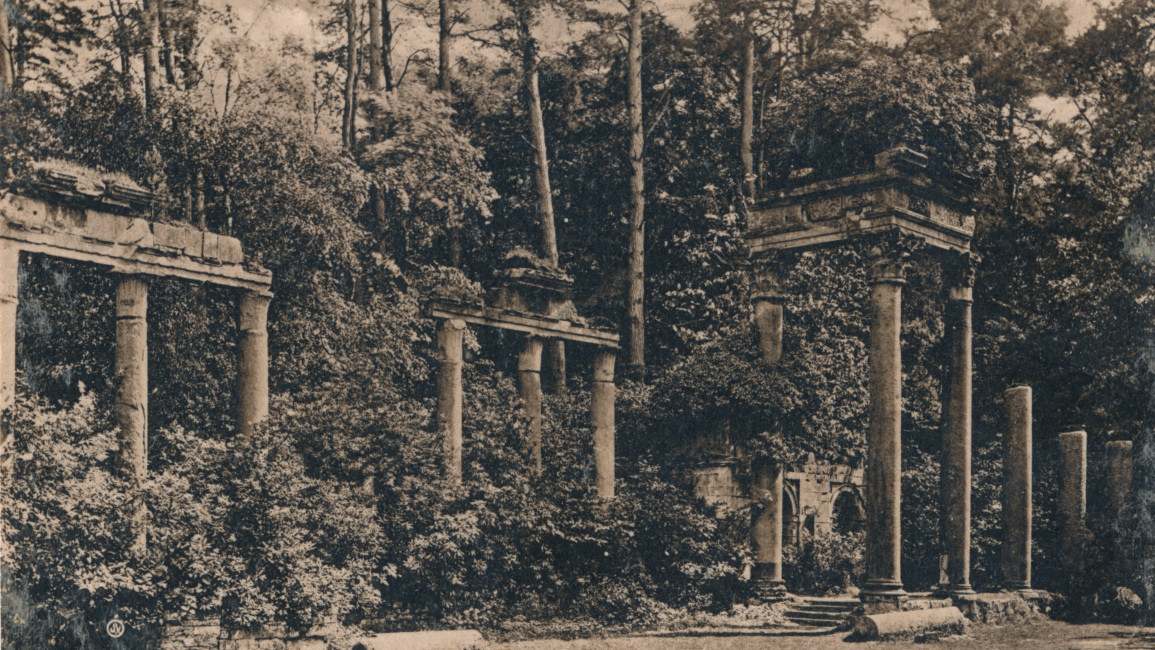Libyan lawyer launches campaign for return of Leptis Magna ruins from Windsor Castle
A Libyan-British lawyer has launched a public campaign this week to reclaim 2,000-year-old Roman relics from the grounds of Windsor Castle in the UK.
Mohammed ben Shaban, the first Libyan to be licensed as a lawyer to the UK supreme court, is lobbying the crown estate to “follow the spirit of international convention in returning these items of important cultural heritage”.
The columns of Leptis Magna - a city built between modern-day Tripoli and Sirte - were stolen from the temple of Augustus in 1817 by British imperial officers Hanmer Warrington and William Henry Smyth.
In the 17th century, 600 columns from Leptis Magna had previously been taken by Louis XIV for use in his palaces at Versailles and Paris. Remains from the site can also be found in Rouen Cathedral and the Abbey of Saint-Germain-des-Preps in Paris.
Ben Shaban is representing the state of Libya and the Libyan Ministry of Culture in pursuing the return of the architectural remains stolen by the British.
إكتشفوا معنا حقيقة سرقة الآثار الليبية و نقلها من لبدة إلى لندن مع المحامي الليبي البريطاني ( محمد بن شعبان ) @MShaban_MSlegal
— Libya in the UK (@LibyaintheUK) April 13, 2022
Discover the real story behind The Leptis Magna Roman Ruins near 📍 London #LibyaintheUk pic.twitter.com/ZvScd7cZph
Lobbying the crown
“We’ve said to the crown: If you have evidence that these Roman antiquities were legally removed from Libya, then please provide it. If you don’t, please return them to Libya,” ben Shaban told The New Arab.
“They currently lie on the crown estate, managed by the National Trust. They’re on the Queen’s land, sovereign land. The Empire has to realise returning items of significant cultural heritage is long overdue,” he said.
“It's like having part of the great wall of China in Bristol. It doesn’t belong there. If you visit it as a normal tourist you’ll appreciate its beauty. But if you’re from the country where it came from, you feel a sense of injustice.”
So far, the legal team lobbying the crown has had little response. “Thus far, the crown’s response has been at best quiet - and at worst, less than respectful,” ben Shaban said.
He believes the crown is “just batting us back, hoping we’ll go away”.
The National Trust is yet to speak publicly about the Leptis Magna columns, but has been contacted for comment.
Claiming back Libya's looted ruins. Leptis Magna ruins at Virginia water, London. Full story on @LibyaintheUK
— Ex Libyan (@ElGadiiii) April 12, 2022
آثار ليبيا المسروقة قبل 200 سنة في حديقة بحيرة فيرجينيا وتر بالقرب من قصر الوندز
المحامي @MShaban_MSlegal
يحدثنا عن مساعيه لاعادة الاثار المسروقة على @LibyaintheUK pic.twitter.com/JLvqGVDHbH
Right of return
While some British institutions have started to repatriate stolen cultural artefacts, the British government’s line is still “return nothing or the floodgates will open”, according to ben Shaban.
British museums often claim custodianship of global heritage, preserving world history that would be at risk in countries experiencing conflict and instability such as Libya.
But the legal team behind the Leptis Magna campaign have spoken to experts who believe the remains are at risk of critical damage due to prolonged exposure to British weather.
“The marble from which these columns were made is not made for British weather. They’re not being looked after more here. The original stoneworkers used material better suited to Libyan weather. It’s next to a lake in the south of England, but it was built for the desert," ben Shaban said.
“This is just a standing example of how empires abused their colonies. They stole oil, gold, people - but when it’s your history, your culture, it’s like stealing part of you, like stealing your DNA.”


![President Pezeshkian has denounced Israel's attacks on Lebanon [Getty]](/sites/default/files/styles/image_684x385/public/2173482924.jpeg?h=a5f2f23a&itok=q3evVtko)



 Follow the Middle East's top stories in English at The New Arab on Google News
Follow the Middle East's top stories in English at The New Arab on Google News


